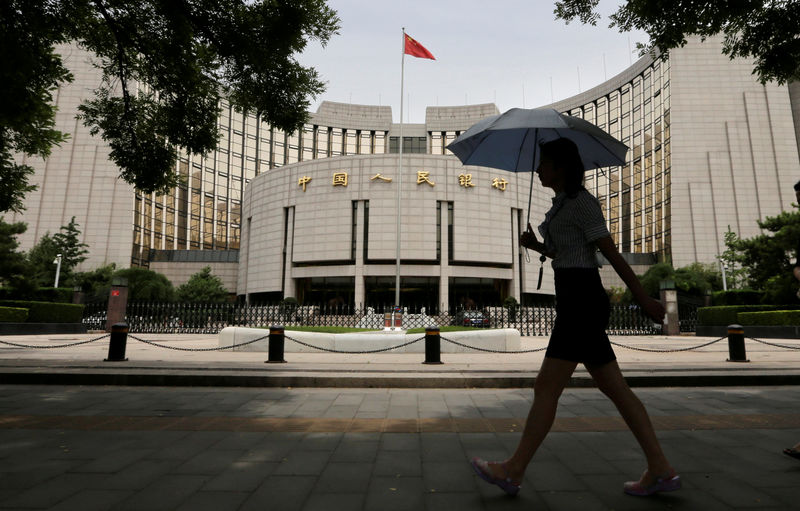BEIJING/SHANGHAI (Reuters) - Ten Chinese banks have raised strong objections to the central bank's recent move to tighten rules on the asset management sector, saying it may cause a rush of redemptions among other risks, three sources with knowledge of the matter told Reuters.
Senior executives from the joint-stock banks said during a closed-door meeting in Shanghai last week that the rules would have a big impact on financial markets and could even "trigger systemic financial risks", according to the sources, who declined to be identified due to the sensitivity of the matter.
The executives also said the new rules on removing implicit guarantees for wealth management products (WMPs) could spark liquidity risks and increase market volatility, the sources said late on Thursday.
The move was a rare protest by Chinese bankers as pressure mounts amid a government campaign to de-leverage and de-risk the country's massive and increasingly complex financial system.
The new rules, which economists described as "a critical turning point of financial regulations", were aimed at closing loopholes that allow regulatory arbitrage, reducing leverage levels and reining in shadow banking activity.
If the current draft of the rules takes effect, banks will be forced to offload assets beforehand, including selling bonds, stocks and other liquid assets at a discount and asking clients to repay loans before time, the sources said.
"No matter which solution we choose, it will hit financial markets," they added.
The combined outstanding volume of asset management products managed by financial institutions amounted to 102 trillion yuan ($15.41 trillion) as of end-2016, central bank data shows.
That was equivalent to 29 percent of total assets of the country's financial system, according to Reuters calculations based on data from the International Monetary Fund.
The banks agreed to submit their joint feedback to the central bank in the hopes of amending the rules, which were first made public in mid-November, the sources said.
The People's Bank of China (PBOC) did not immediately respond to a faxed request for comment.
The new rules will pose a direct challenge to a business model that small- and mid-tier banks have been relying on to drive asset expansion and profit growth, bankers told Reuters earlier.
"Every time when the regulators announce tighter regulations it would almost always benefit the large state banks and hurt the smaller ones, because they (the latter) are taking much bigger risks," said a senior executive at one of the country's big four state-controlled lenders.
The joint-stock banks, which are unable to compete against large state banks for public deposits, have depended on selling WMPs with implicit guarantee of fixed returns to attract retail fund. In turn, they invest the money they manage into stocks, bonds and non-standard debt assets to generate profit.
Bank executives said at the meeting the 28.38 trillion yuan of banks' WMPs, part of the so-called shadow banking sector, have allowed them to bypass regulatory restrictions on credit expansion and capital constraints.
BOND YIELDS SOAR
Chinese government bond yields reached three-year highs in late November as uncertainty over the new rules and a broad crackdown on risky financing contributed to a sell-off.
The 10-year treasury bond (CN10YT=RR) yield hit 4.03 percent on Nov. 23, four days after the release of the guidelines, capping off seven weeks of surging yields that began in the run-up to China's 19th Communist Party Congress.
"I don't think the PBOC or the authorities would like to distress the market," said Frances Cheung, head of Macro Strategy for Asia at Westpac, adding the initial sell-off particularly affected liquid government and policy-bank bonds because they are easily sold.
The banks also said rules on strictly limiting bank WMP investments in non-standard debt assets and private equities would reduce their support for the real economy and increase financing costs for companies, the sources said.

They also suggested the central bank remove certain rules and extend the transition period for the new rules - currently up to June 2019 - to three years to smooth the impact, the sources said.